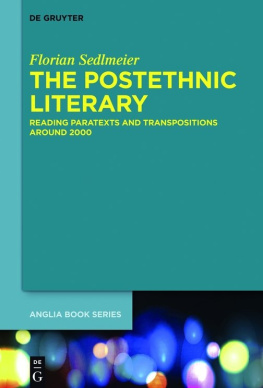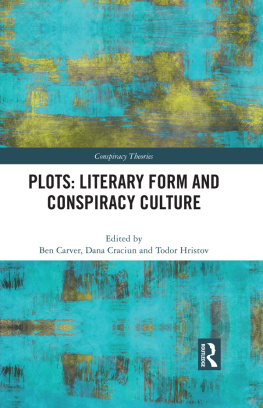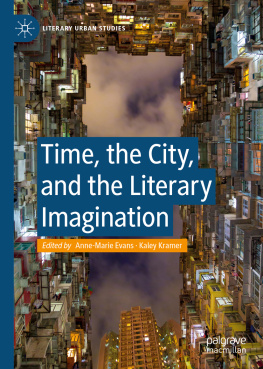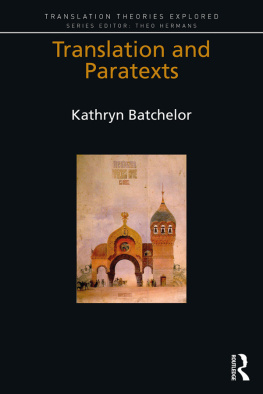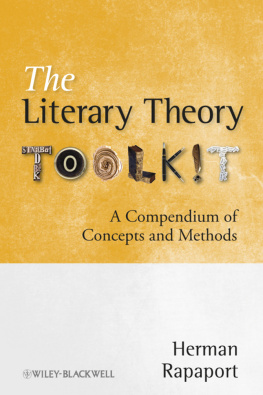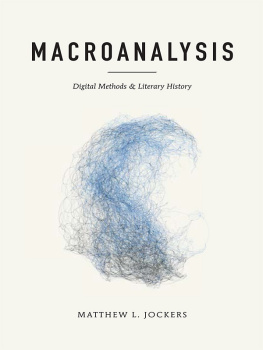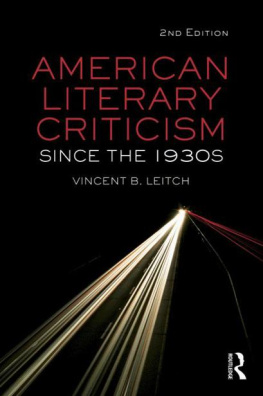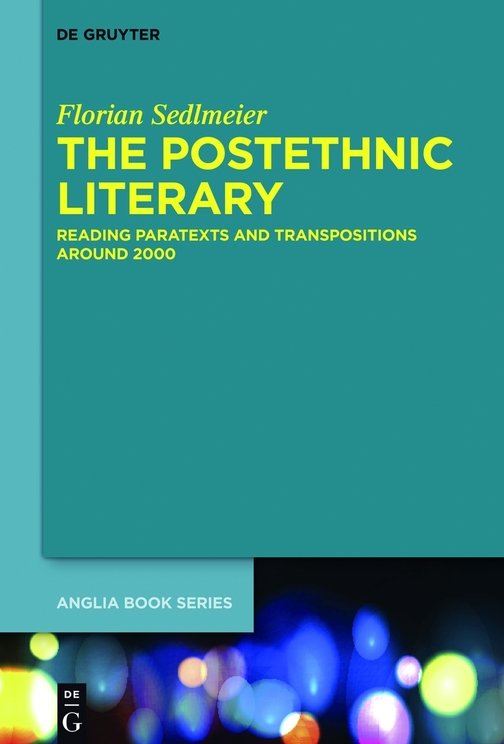This book would not have been possible without the intellectual curiosity of several colleagues and the support of various institutions and their representatives. Peter Schneck and Gabriele M. Schwab gave crucial advice to this project from its inception. I also want to thank Aleida Assmann and Ralph J. Poole for their varied forms of encouragement and endorsement. Discussions with Charlton Payne, Travis Tanner, Michael Thomas Taylor and Susanne Wegener have left their indelible marks on these pages. Ian Macgregor Morris, Charlton Payne and Michael Thomas Taylor helped editing the text at various stages of revision. Jasper Joyce Verlinden has been indispensable in formatting the manuscript. I thank the editors of Anglia Book Series and Walter de Gruyter for their support and swift work. Finally, this monograph was made possible by the resources of the University of Konstanz, which granted me a fellowship in the Graduierten-kolleg Die Figur des Dritten funded by the Deutsche Forschungsgemeinschaft (DFG), the University of Salzburg, the Embassy of the United States to Austria, and the Fulbright Austrian-American Educational Commission.
Coda
The How is the What: Constellations of the Postethnic Literary
This study has explored the epistemological conditions for theorizing a notion of the postethnic literary. It has conceived the postethnic literary as a reading practice that is dependent upon the investment in a specific kind of literary form that characterizes and unites the prose texts by Alexie, Kincaid, and Lee. By means of a series of paratextual, intratextual, and intertextual transpositions, these tales written by writers who are discursively marked and marketed as U.S. ethnic or postcolonial demand to be read formally from within and against these paradigms of communal and cultural representativeness and the poetics of corrective rewriting and a politics of enunciation they promote. Construing these texts in this way places them profoundly at odds with the various contemporary reconfigurations of the grounds of comparison that are expressed in a conceptual tropology of the map, the scale, or the planet. The postethnic literary that I have elucidated here suggests that we read these texts instead by constructing and deciphering decidedly artistic and literary constellations. This notion defies the current trend characterizing a heterogeneous set of approaches that prioritize tropes or interpretations of expansive inclusion on the basis of cultural recognition and representativeness.
In the first chapter of this book, I criticized Morettis retrieval of quantitative social science for a practice of distant reading that develops taxonomies of literary genres (see 187207). Gayatri Spivak criticizes Moretti, too, on similar grounds, insisting that we recognize in Morettis arguments the importance of a close reading that enables and complicates his claim to scopic vision in the first place (Spivak 2003: 108, n.1, see also 30). Spivak intends to confront the best of the old Comparative Literature: the skill of reading closely in the original (Spivak 2003: 6) with the need to collaborate with and transform Area Studies (Spivak 2003: 19) in order to make visible again the problem of cultural and political collectivities that Morettis approach cannot properly account for. Anchoring her idea of comparison in language and idiom, she advocates a reading for literary language and linguistic competency in order to unsettle the apparitions of Cultural and Ethnic Studies as well as the arrogance of Area Studies where it retains the imprints of the Cold War (Spivak 2003: 70). The task that appears to follow from her approach is to learn as many languages as possible; she proceeds under the questionable assumption that original languages will more fully express various configurations of the other. She contrasts the skill of reading closely in the original against copying (rather than cutting) and pasting as part of the general technique of the new comparative literature (Spivak 2003: 34). At first glance, this copying, which she conceptualizes as teleopoiesis (a term she borrows from Derridas The Politics of Friendship ), seems equivalent to the poetics of transposition I introduced in this study. Spivak describes its dynamic as follows:
Citation of citations, indefinitely. Teleopoietic reversals, in the interest of a community of the future anterior of the perhaps. A slow but tenacious change of mind quickly dismissed as a-political in the quick fix of organizational thinking. The classroom, represented in the book, is a simulacrum of the possibility of this. I am suggesting that such indefinite citation of citations, altered by the teleopoiesis until the author is hardly recognizable is the space of something that can be called non-European Marxism []. (Spivak 2001: 1314)
Teleopoiesis turns out, she suggests, to be another conceptual trope of strategic positivism, which she reclaims here as both a pedagogical practice and an intertextual structure, and which is directed at retrieving an ethnographically informed version of Marxism as a possibility of They are preconditioned by a longing for totality, albeit one registering various modes of alterity (in the last section she brings together the notion of the planet and gender as a critical discourse). In effect, her general presupposition is the same as Morettis, whose arrays and indices of genre strive for completion from a different end.
In contrast to Morettis telos of mapping and Spivaks telos of the planetary, my focus on the decidedly artistic constellation of the postethnic literary has rather limited aims and yet more precise concerns. It grounds my comparison of a limited corpus of contemporary literary texts in the commonality of a self-reflective awareness of the institutionalized discursive formations of U.S. multicultural and postcolonial studies. These formations hinge upon the paradigm of representativeness, the conceptual tropes of liminality as an integral effect of that paradigm, the politics of enunciation, the autobiographical fallacy, and the poetics of corrective rewriting. It is the identification of this discursive formation as a convention and as a horizon of expectations that licenses the conception of the postethnic literary. This conception, in turn, is contingent upon an investment in literary form and a differentiation between the representation of differential subject positions and textually expressed, individual authorial positionality. This individual authorial positionality is a gesture restricted to the confines of the text; as I have shown, it is effectuated by a foregrounding of the conditions of artistic and literary representability in the intermedial texture and transpositions of these novels. The version of close reading required for these case studies explores a specific configuration of literariness; it exposes the ways in which a self-reflective investment in literary form carves out the conditions for a kind of comparison that cuts across the concerns of representativeness and that, in turn, privileges artistic constellations and authorial gestures from within and against institutionalized paratextual frameworks.
Consequentially, I close this study by reading another paratext rendered literary by a novel: the preface to Dave Eggerss novel What is the What (2006). According to the definition scrutinized by my study, this text by the Anglo American Eggers cannot be postethnic literature because it never could have been ethnic literature in the first place. Yet insofar as the novels preface formally expresses a self-reflective awareness of the discursive formations of U.S. multicultural and postcolonial studies, that is to say, of their regulating modes of production and reception, the work lends itself to a reading in terms of the postethnic literary understood as a specific contemporary artistic and discursive constellation. While the transpositions in the texts I have previously discussed negotiate the conditions of authorial positionality and literary representability vis--vis representativeness, the postethnic literary in Eggerss novel reconciles self-reflective formal play with sociopolitical commentary. Of the novels discussed so far, Lees Native Speaker comes closest to such an ambition, which can be inferred from its critique of publics that are constructed by media representations, as well as from its negotiation of the conditions of a decidedly literary citizenship from within and against these media frames.

